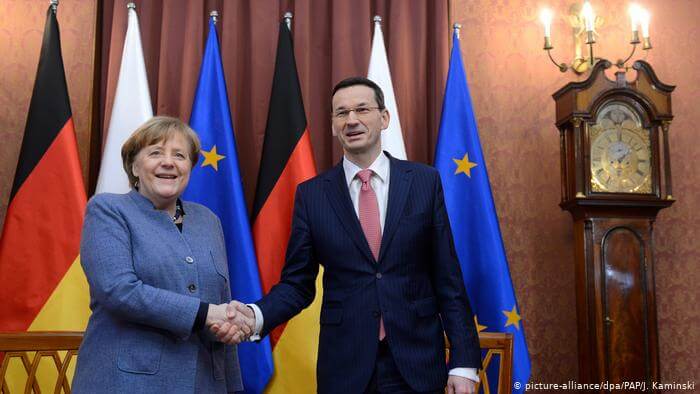German Chancellor Angela Merkel met Polish Prime Minister Mateusz Morawiecki during her last visit to Warsaw before leaving office at the end of this month. The leaders discussed the migration crisis triggered by Belarus, collective climate policy, and international security.
Polish Migration
Poland is currently bolstering security along the Polish-Belarusian border to prevent illegal migrants from Iraq, Syria, and Africa entering via Belarus. To achieve this, Polish President Andrzej Duda introduced a state of emergency on a strip containing 183 towns along the Poland-Belarus border last week. Poland’s installation of this 40 km long border has received backlash from Belarus and the United Nations Refugee Agency for being “inhuman” towards the migrants who remain stuck.
Last week, Merkel referred to Belarus’ action at the Polish border as “using people, refugees or people from other countries who are in distress, as hybrid cyber-attacks” to orchestrate chaos within the EU. She reiterated her stance on Saturday and said, “We must give humanitarian aid [to the migrants], but we must protect the external borders of the European Union.”
“On this matter, Poland and Germany have the same position and unequivocally condemn these actions. They consider them to take advantage of the plight of people, illegal migrants, to then use them to attack the European Union,” Polish diplomat Jakub Kumoch said after Merkel and Morawiecki concluded their meeting.
Climate Policy
Morawiecki emphasised that the “schedule and characteristics of changes in the area of environmental protection and climate must reflect the characteristics of the economies of individual countries.”
Merkel said Poland had made immense progress in its transformation from the previous energy system. She commended Europe’s “common commitment and obligation” to achieve climate neutrality by 2050, praising Poland’s advancements in climate policy in particular.
Moreover, the leaders voiced diverging opinions on certain contentious issues such as the Nord Stream 2 Pipeline, Poland’s ongoing conflict with the EU over judicial reforms, and the newly adopted rule of law that violates LGBTQ rights.
Nord Stream 2
The two leaders briefly discussed the controversial Nord Stream 2 Pipeline, whose construction was completed on Friday. The Pipeline is built to directly carry gas from Russia to Germany, bypassing its earlier route via Ukraine. Like Ukraine, Poland believes that the Pipeline puts it at a significant disadvantage of losing transit fees and places Russia in an unfair position of power over European gas supplies.
A joint statement by Ukraine and Poland in July read: “This decision has created a political, military and energy threat for Ukraine and Central Europe, while increasing Russia’s potential to destabilise the security situation in Europe, perpetuating divisions among NATO and European Union member states.”
However, Merkel believes that the Pipeline is a “good step” for the EU’s future. She argued that Nord Stream 2 would not impact Ukraine and Poland negatively, as it “sets out plans to invest in the Eastern European country, as well as actively ensuring that Moscow and Kyiv extend a gas transit agreement.”
Merkel upheld her stance during the meeting and reassured Morawiecki that the Pipeline would not cut off gas from Ukraine. “I made it clear that it is our concern that Ukraine will remain a transit land for Russian gas,” she confirmed.
“We discussed security related to the transit of gas through Ukraine and Poland, in the context of the changing position of the United States,” Morawiecki wrote on Twitter.
Rule of Law
The European Commission decided to launch an infringement procedure against Hungary and Poland in July, pressing financial sanctions and threatening to retract funding over their “discriminatory” rule of law that goes against the values of the EU.
The Commission also demanded that Poland dissolve the judges’ Disciplinary Chamber. The EU believes that the Chamber is responsible for unlawful actions and exerting political control over judicial decisions. Brussels sees it “as a threat to the country’s judicial independence that makes judges subject to political control.” The Commission has pushed for Poland’s judicial independence, threatening to levy sanctions higher than €100,000 a day.
“The Commission is asking the Court to impose a daily penalty payment on Poland for as long as the measures imposed by the court’s order are not fully implemented,” it said in a statement.
Poland has rejected the ruling, arguing that it was inconsistent with the Polish condition and, therefore, non-binding. Polish Deputy Justice Minister Sebastian Kaleta responded to the Commission’s move, saying, “The European Commission is illegally blocking Poland funds and calling for sanctions. These are acts of aggression.”
Merkel, a pivotal figure representing Brussels, was earlier criticised for failing to “stop democratic backsliding” in Eastern Europe during her time in office. During the meeting, she urged Morawiecki to act upon the demands of the Commission. “On the rule of law, we talked in-depth about this...we prefer this to be resolved through talks...resolving things with court cases is of course always a possibility in a country with the rule of law, but politics is about more than going to court,” Merkel said.
Considering the widening gap between Poland and the EU, experts fear a formal ‘Polexit’ while others claim that most Polish people favour EU membership.
Post the meeting, Morawiecki thanked Merkel “for a period of valuable cooperation between our nations, full of economic success, great growth in mutual trade, scientific exchange and strengthening of European ties.”
Merkel Makes Final Trip To Poland, Discusses Migration Crisis, Climate Policy
German Chancellor Angela Merkel met Polish Prime Minister Mateusz Morawieck in Warsaw on Saturday. They discussed the migration crisis and climate policy, and disagreed on several contentious issues.
September 15, 2021

Merkel received a warm welcome from Morawiecki despite diplomatic tensions between their countries. SOURCE: J. KAMINSKI/PICTURE ALLIANCE
